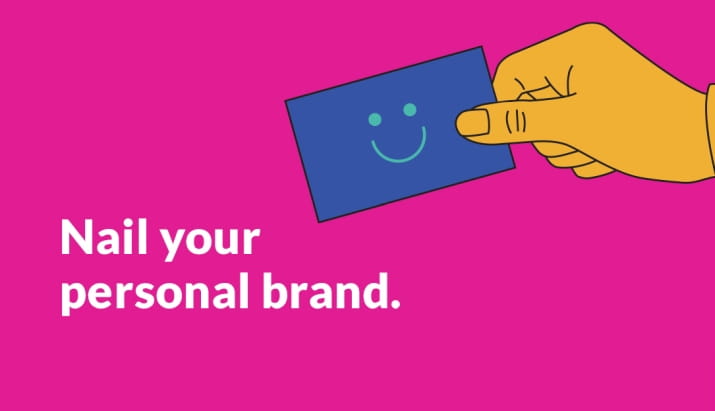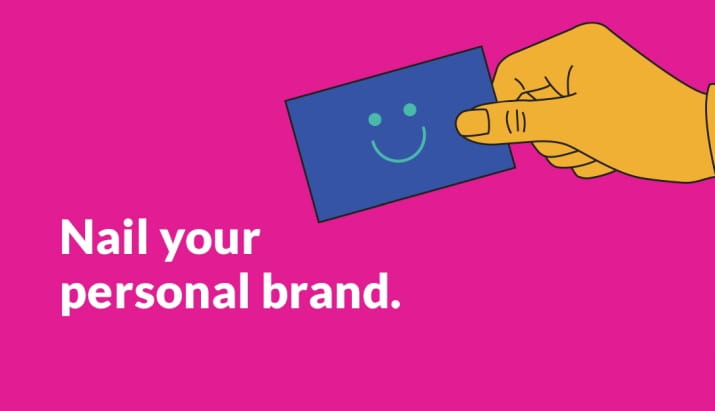3 ways to nail your personal brand
Preparing for the modern workforce requires a bit of self-marketing. Here’s how to develop a personal brand and stand out above the rest.

As human beings, it can be hard to think of ourselves as “brands” - things that require marketing or selling in order to be trusted or recognised. But whether we like it or not, your reputation matters, and everyone leaves their own unique impression on the world of work.
Some may call this new way of looking at your reputation a ‘personal brand.’ Amazon founder Jeff Bezos simply calls it “what people say about you when you’re not in the room.”
As the pandemic continues to negatively impact employment, competition may increase in the workforce, and you may not be able to rely on your qualifications alone. So, whether you’re looking to up-skill to remain relevant or re-skill to secure your future, you’ve got to sell yourself to companies as forward thinking, passionate, integrates and ready to add unique value in complex times like these.
Here are 3 ways to develop your personal brand and stand out above the rest:
1. Champion your soft skills
In addition to formal training, every person has a natural range of ‘human-centric’ soft skills that are valuable to the workplace. Skills like empathy, communication, storytelling, emotional intelligence and creativity are becoming increasingly sought-after in the workplace, as they give employees the ability to evolve and better respond as the world around us changes. Even maintaining a positive attitude could make you a valuable asset to your company in the current climate.
So, create a new section on your CV to highlight your most valuable soft skills. Include how you developed them through study or on the job. This demonstrates how you can add value more broadly and what you can contribute to help a business or a team move forward.
2. Make your voice heard
The most successful brands are the ones that contribute to discussions and solutions bigger than themselves. And when it comes to people and personal brands, the same can be said. In fact, a study by Edelman and LinkedIn showed that 55% of executives examine a supplier’s thought leadership and online presence before deciding to hire them. And the same recruitment lessons can be applied to individuals.
Being a thought leader doesn’t mean you have to become an extrovert overnight. Instead, start contributing a few ideas or opinions backed by credible sources to your professional social media networks (like LinkedIn). Alternatively, start a blog, or share inspiration on your internal work platforms, making use of the increased digital media consumption we’ve seen during COVID-19.
Not only will people know who you are by your online conversations, but they’ll appreciate that you’re genuinely immersed as an active contributor in your field, and trust that it’s not just a 9–5 job for you.

3. Be yourself
There was a time when many of us would have avoided showing our true self at work. But today, businesses value people from different backgrounds who can contribute new perspectives, ideas and approaches.
Your personal quirks and life experiences outside of work can go a long way in helping recruiters understand who you are and what skills you could offer to business. If you’re a musician on the weekends, that speaks to your creativity. If you’re part of a hiking club or a sports team, you might be a good leader (or team player). And if you’re an activist or donate your time to charity, recruiters can immediately see your values and your commitment to helping others.
Your formal learning is crucial, especially in fields where it is a prerequisite. But these days, a long list of certificates alone might not be enough to put your CV at the top of the pile, or help you build the trust needed to advance your position. With all the extra time we’re spending at home these days, see this as your chance to review and update your CV and social platforms or make a plan to set weekly goals based on at least one ‘self-marketing’ activity a week.
Find out more about the in-demand soft skills that Australian recruiters are looking for, and why they’re important to add to your CV.
Browse thousands of courses from leading Australian universities.
Or complete the form on this page to chat to an advisor about study options.



